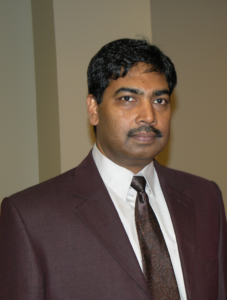PRAIRIE VIEW, Texas (September 10, 2020) – Kuala Lumpur is the largest city in Malaysia. It’s also home to over 1.8 million people. Commuters there spend an average of 321 hours in traffic each year. According to Uber Malaysia, they spend another 152 hours each year in search of a parking spot.
According to the Texas A&M University Transportation Institute’s Urban Mobility Report 2019, “Traffic congestion causes Americans to be in their vehicles an additional 8.8 billion hours and purchase an extra 3.3 billion gallons of fuel. The extra fuel costs over $166 billion.”
Shuza Binzaid, Ph.D., principal investigator (PI) for a recent National Science Foundation EArly-concept Grants for Exploratory Research (NSF-EAGER) project, plans to change these numbers. The research associate professor in Prairie View A&M University’s (PVAMU) Department of Electrical and Computer Engineering is working on new research with Co-PI and colleague, John Attia, Ph.D., in PVAMU’s Smart Microgrid Advanced Research and Technology (SMART) Center that aims to relieve urban traffic congestion. Taking it one step further, they’ll use renewable energy technology to get it done.
“We are collaborating with Nawshad Amin at Universiti Tenaga Nasional to see how renewable energy technology in bike lanes can reduce high commuter numbers in Kuala Lumpur,” said Binzaid. “I hope that my concept of renewable energy generation from bike lanes can help solve some of the concerns and challenges of traffic congestion, energy production, and distribution.”
Binzaid says it all starts with people choosing to use bicycles to get around instead of cars. This can reduce overall vehicle congestion and fuel consumption.
“We’re planning to implement renewable energy technology into the bike lanes in Kuala Lumpur,” he said. “This includes serving clean drinking water to cyclists using a reverse osmosis process for collected rainwater powered by a renewable energy source.”
They will also add crucial information, including weather and heat index statistics, at information booths along the bike lanes. Binzaid hopes the project, in turn, will have a significant impact on not only Kuala Lumpur but also urban cities across the U.S.
“This rare fund from NSF-EAGER for ASEAN Cities has brought us the opportunity to explore a new concept of renewable energy technology,” said Pamela Obiomon, Ph.D., dean of the Roy G. Perry College of Engineering. “The development of bike lanes and implementing it in one of the smart cities in the world will further increase the research capabilities at PVAMU, expand knowledge and training for our students, and possibly help implement this technology globally.”
Magesh Rajan, Ph.D., vice president for the Division of Research & Innovation at PVAMU, said, “This innovative technology can vastly improve the traditional ways of traveling in both urban and rural areas. We are excited about the global possibilities of this smart technology and that Prairie View A&M University is a key part of the process.”
###
By Karen B. Cotton


